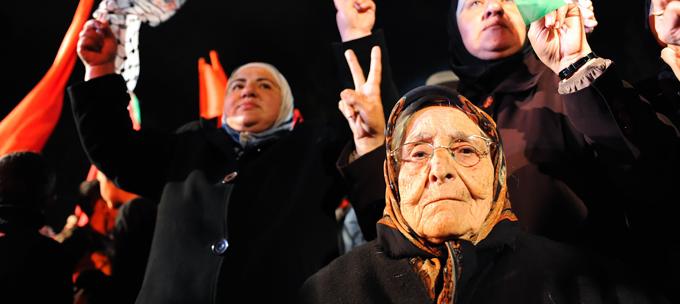
Photo by Ben Kelmer, courtesy of Just Vision.

Photo by Ben Kelmer, courtesy of Just Vision.
Women protest for freedom, dignity, equality, and human security in the Sheikh Jarrah neighborhood of East Jerusalem.
Achieving durable peace depends on sustained engagement among groups with diverse perspectives to build relationships and explore opportunities for compromise. Breaking cycles of conflict and repairing past harms requires transformations in attitudes, institutions, doctrine, and strategy, as well as the prioritization of well-being, rights, safety, and dignity of communities affected by conflict. Building a more peaceful international order requires diplomatic and policy frameworks based on principles of interdependence and shared security. Particular focus must be on shifting U.S. foreign policy, given its outsized role.
The Peacebuilding program aspires to advance just and durable peace through nonviolent means by supporting policy analysis, dialogue, and pro-peace movements. Research shows that when women, youth, local communities, and marginalized groups play a vital role in peacebuilding processes, peace outcomes are more robust and durable. By engaging a wide array of actors—especially communities impacted by violence—the program explores policy paradigms that address root drivers of conflict, including rights violations and impunity, to improve security for all.
The program focuses on conflicts that have a disproportionate influence on global security and in which the United States has had significant involvement. Through its support of frontline peacebuilders, policy architects, and influencers, as well as broader policy interventions, the program seeks to encourage broader shifts in the trajectory of U.S. foreign policy toward peace, justice, and human security. It funds both bottom-up and top-down efforts to transform conflict.
The Fund pursues interrelated strategies to advance conflict transformation of specific conflicts—Afghanistan and Israel-Palestine—as well as conflict prevention efforts elsewhere to de-escalate tensions and develop policy frameworks that advance peace. The Fund has a particular interest in advancing shifts in U.S. foreign policy.
The Peacebuilding program funds organizations with strong records of collaboration on conflict transformation. Grantees utilize an array of nonviolent strategies to open space for critical thinking and renewed public debate on the realities of conflict. The longstanding nature of the conflicts in Israel-Palestine, Afghanistan, and between the United States and Iran necessitate long-term partnerships, minimizing resources available for unsolicited grant applicants. By law, the RBF cannot provide funds earmarked for lobbying in the United States or internationally. Read more about What We Fund.